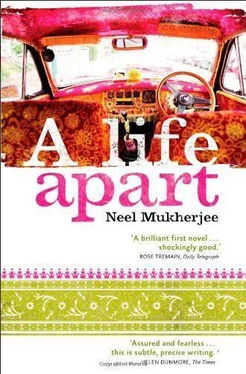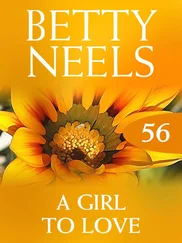He gives up. His heart is an eel, describing its endless Möbiusstrip dance, over and over again. There is no point going down to the loos now; he is suddenly tired and uninterested. He walks slowly back down Broad Street; a keen wind is whipping up little local whirlpools of dried leaves beside a phone booth. Almost without thinking, he walks into the booth, picks up the phone, and the index finger of his right hand — not he, not the entire person — punches in the freephone number: 328665. As soon as the phone starts to ring at the other end, he slams his receiver down on its metal cradle.
He breathes in and out for a couple of minutes, aware of each inhalation and exhalation, then redials the number. . This time he lets the phone ring. At the fourth ring, a voice answers, ‘NSPCC Helpline. How can I help?’
The voice is so familiar he can see the bridge of fading freckles under her eyes and over her nose if he shuts his eyes. He can’t answer.
‘Hello? Can I help?’ Her voice gentle, ever so kind and gentle.
‘No.’ The word rushes out before he has had a chance to string together other words into a sentence.
‘Do you have anything to say?’ she asks, slightly coaxing now, but still kind.
‘No. . I mean, yes, yes. .’
‘Yes?’
He is shallow-breathing in fairly rapid bursts now. ‘Could you tell me something about about about child abuse?’ Pause. ‘Please.’
There is nothing in her voice, no sharp intake of breath, no silence left hanging for more than its seemly duration, to tell him that his voice has been recognized and his face mapped on to it. But he knows, in the way the telephone receiver seems to have become sentient in his clammy left hand, or by what he suddenly feels to be a slightly different ordering of the air and signals between the two ends, somewhere deep under the ground, in the souls of the cables.
Her voice is collected, unswerved by the new knowledge. ‘What exactly do you want to know?’
Pause. ‘I don’t know.’
‘Do you want to report anything?’
Silence.
‘Whatever you say to us is in strictest confidence. If you choose not to identify yourself, that is perfectly all right.’ The professional words ring strained in his ears. Perhaps in hers as well.
‘It’s it’s about me.’
‘I take it you want to report something about your past?’
Pause. Then a whispered ‘Yes’.
‘Pardon?’
‘Yes,’ slightly louder.
‘Have you talked to anyone else about it?’
‘No, no.’
There is a long silence during which he imagines their words, broken down into constituent letters and then further into electric signals and sound waves, travelling down cables and coalescing into human words again just before they spill out of the earpiece into her ear. He wishes they would remain atomized forever within the cable and get lost in a little black hole along the line and never reach her.
‘Do you want to talk about it now?’ Her voice has become that of a ministering angel’s again.
His throat is a constricted passage of pure obstruction, blocking his words, choking out sound. He is not aware of little guerillas of words escaping this tyranny of his throat. ‘It’s my mother.’
Silence from her.
‘My mother. .’ he tries again.
‘Yes?’
‘My mother used to. . beat me.’
‘What sort of beating was it?’
Pause. ‘Severe.’ That’ll do, he thinks.
‘How old were you at the time?’
He doesn’t answer the question. He could be talking to himself as the refractory words tumble out: ‘Once when I was six I used some abusive term which I’d picked up from god knows where. You know, nothing very offensive. Roughly translated it would mean “child of a pig”. I suppose it has the same heft as “bastard” here.’ His voice is reasoned, calm, almost reflective. He is telling a story now in which he is a character; as raconteur, he manages far better, for it could be someone else’s story. Indeed, it is someone else’s story.
He continues, ‘She was making chapatis, you know, flat Indian bread, on a griddle on open coals. She had a pair of tongs and a metal fishslice sort of thing, which she was using to flip the bread over. As soon as she heard the words, she looked at me and asked me to say the words again, as if she hadn’t quite heard them. I gathered that something was wrong, that the words were bad, so I kept quiet. She kept on asking me to repeat them. Then she reached forward and and and. .’
The barrier of fiction, without any warning, suddenly gives way. The words become painful pushes against a throat sealing up again. ‘. . and she hit me on my thigh with the hot iron spatula.’
Pause. On both sides. He can’t hear her breathing. For all he knows, she might have gently put her receiver down on a table and gone away, while his words leak out into a spartan cell, institutional and characterless, and it is only the room that registers the immediate peeling off of a ninesquare inch area of skin, like the papery bark of an arbutus tree, the slow seconds of silence and awe watching this wonderful ruching and metamorphosis of blemish, then the deferred shock of pain.
Her voice returns. ‘Hello, hello? Are you still there? Hello?’
He doesn’t answer; instead, he replaces the receiver, but this time with infinite gentleness, as if he is cradling the head of a newborn, fragile as eggshell, so delicate, so vulnerable to hurt.
Outside, the wind is making ever more furious eddies and edgeless, formless pillars of rising and falling leaves, all atonal brown. At the lit display window of Blackwells, a shy, uncertain Mary looks down from her home in the shiny open pages of a luxury art book at some unspecified spot near his feet. One palm is outstretched and open, pointing downwards, as if she has just finished doling out some grace. He almost looks around him to see if it is still dispersed in the restless air around him.
‘Dighi Bari’,
Nawabgunj,
Bograh Distt
Bengal
October the 28th, 1902
Dear Violet,
I read with great regret and dismay of the troubles you are facing in your school. If the Bengali babu is not going to interfere in these petty racial squabbles and take immediate action against the separatist poison that is choking the country and which, I am sad to say, our countrymen are doing nothing to either allay or eradicate, instead strengthening it for their own petty political games, I am afraid, Violet, the only way to keep the school running might be to have Hindoo and Muslim girls attend on alternate days. I know it goes against our most fundamental principle of unity but we are both in agreement that the education of Indian women is of far greater importance than trying to solve their race wars, which we are too small to effect. If the Hindoo-Muslim animosity, which, I am reliably informed (and my readings seem to confirm, too), goes back centuries, deflects us from our true task, then we will have lost our battle in bringing the light of knowledge to Indian women. I only wish I could be there beside you at this hour of your need and help you in any way that you might require, or I, in my limited capability, can provide.
You ask of my news. I am very well here and derive considerable joy and pleasure from being part of the Roy Chowdhury family. I have already acquainted you with my accidental straying into the andarmahal last year, haven’t I? Well, since that time, I have not only been accompanied and given a ‘Grand Tour’ of the place by both Bimala and Mr Roy Chowdhury, but I am also invited there occasionally to tea and, on two occasions, to lunch. It seems that Mr Roy Chowdhury has talked sense into his widowed sisters-in-law — he treats them as if they were his own blood — and convinced them, with reason and arguments and affection, that having a Christian lady step into their quarters is not going to defile them or turn them into pariahs. I think curiosity, rather than instruction, has ultimately got the better of them.
Читать дальше












